Europa Report Blu-ray Movie
HomeEuropa Report Blu-ray Movie 
Magnolia Pictures | 2013 | 90 min | Rated PG-13 | Oct 08, 2013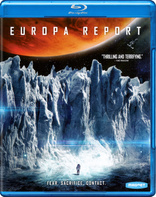
Movie rating
6.6 | / 10 |
Blu-ray rating
| Users | 2.5 | |
| Reviewer | 4.0 | |
| Overall | 3.7 |
Overview
Europa Report (2013)
A crew of international astronauts are sent on a private mission to Jupiter's fourth moon.
Starring: Michael Nyqvist, Sharlto Copley, Daniel Wu, Christian Camargo, Embeth DavidtzDirector: Sebastián Cordero
| Sci-Fi | Uncertain |
| Thriller | Uncertain |
Specifications
Video
Video codec: MPEG-4 AVC
Video resolution: 1080p
Aspect ratio: 1.78:1
Original aspect ratio: 1.85:1
Audio
English: DTS-HD Master Audio 5.1 (48kHz, 16-bit)
Subtitles
English SDH, Spanish
Discs
25GB Blu-ray Disc
Single disc (1 BD)
Packaging
Slipcover in original pressing
Playback
Region A (locked)
Review
Rating summary
| Movie | 4.0 | |
| Video | 4.5 | |
| Audio | 4.5 | |
| Extras | 2.0 | |
| Overall | 4.0 |
Europa Report Blu-ray Movie Review
Between the Lines
Reviewed by Michael Reuben October 6, 2013A film about a space mission to a moon of Jupiter that encounters something unexpected can't help but remind viewers of Stanley Kubrick's landmark 2001: A Space Odyssey. Director Sebastián Cordero addresses the issue up front by having mission control play the crew an excerpt of "The Blue Danube Waltz" shortly after takeoff. They've all seen Kubrick's film, and the crew smiles at the reference. They know they're following in the footsteps of the ill-fated Discovery, but they don't know at this point that their ship, the Europa One, will encounter difficulties that are equally dangerous, though less metaphysically vexing. Besides being an entertaining sci-fi adventure, Europa Report also serves as a kind of cinematic dialogue with Kubrick's epic across a span of 45 years. The script by Philip Gelatt shares much of 2001's sense of the individual's—and even humanity's—cosmic irrelevance before the vastness of space. Cordero wisely doesn't try to compete with Kubrick in conveying that sense visually, but he does find new ways of capturing the efforts of ordinary people to adapt to the close quarters and unnatural environments of space travel by using the now-familiar techniques of "found video". Replacing Kubrick's omnisciently roving camera with the mechanized omniscience of recording devices located through Europa One (a technique foreshadowed by Kubrick in the HAL-9000 computer's multiple sensors), Cordero shows us the crew at work and leisure, as well as innumerable details of their mission and its challenges. But that isn't all Cordero shows us. The title of the film is Europa Report, and as the film's composer, Bear McCreary, notes in the extras, the film doesn't present itself as "found video". It's a documentary edited, shaped and narrated by the CEO of the corporation that funded, designed and guided the Jupiter mission—and now that company urgently needs to do some public damage control after sixteen months of public inquiries about the mission. Early on in this "report", we are told that a crew member has died, but not until halfway through the film do we learn the circumstances. (The crew member is identified in passing, and it quickly becomes evident who is missing.) Why the postponement of that information? Why the multiple narrators? Why has the footage—recently declassified, according to onscreen text—been presented out of order and structured like an adventure story? What is the real purpose and who is the real audience of this "report"? To avoid spoilers, I won't try to address these questions, but they are worth pondering as the end credits scroll.
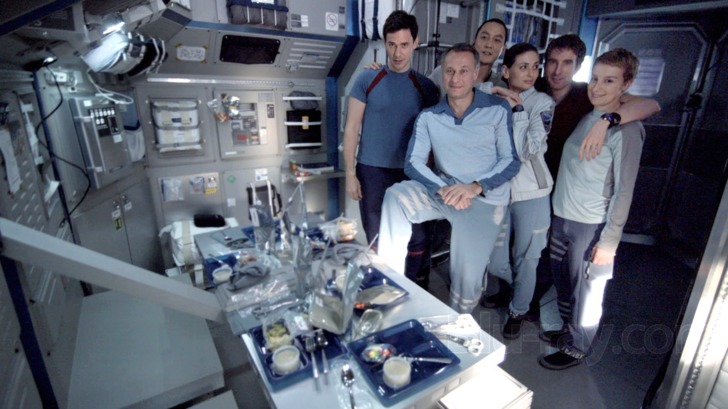
The film's (and report's) main narrator is Dr. Samantha Unger (Embeth Davitz), CEO of Europa Ventures, which built Europa One and, in cooperation with NASA, launched it to explore the sixth-closest moon of Jupiter, after new readings detected heat signatures below the planet's icy surface. Additional narration is provided by Dr. Sokolov (Dan Fogler) and, in news footage from the time of launch, Dr. Tarik Pamuk (Isiah Whitlock Jr.), both top Europa scientists. Additional key narration comes from Europa One's pilot, Rosa Dasque (Anamaria Marinca, 4 Months, 3 Weeks and 2 Days), whose insight into her shipmates is so acute as to be almost philosophical. All of the narrators address the camera directly, which makes their footage instantly distinguishable from the recordings taken from video feeds throughout Europa One's interior and exterior, as well as from spacesuit helmets. One of the early clues that the "report" from Europa Ventures may be less than straightforward is its failure to proceed in a direct chronological line. Instead, we are told about a communications blackout that occurred early in the mission, which was to last almost four years for a complete round trip. No one on the ground knew the cause of the blackout or even if Europa One and its passengers survived, and Dr. Unger waxes eloquent and tearful ("I'm sorry!" she says, her voice apparently catching; or does it?) as she describes the long months of not knowing, during which she could only look up and hope that the mission was continuing. Not until the very end of the report is it revealed when and how contact was reestablished and by what means the extensive video record for the report was provided. Europa One left with a crew of six. Their mission was to reach the surface of the Jupiter moon and investigate both above and below the ice. In addition to pilot Rosa Dasque, the crew members are: William Xu (Daniel Wu), the mission commander; Andrei Blok (Michael Nykvist, Mission Impossible: Ghost Protocol ), the chief engineer; James Corrigan (Sharlto Copley, District 9), also an engineer; Dr. Katyva Petrovna (Karolina Wydra), a marine biologist; and Dr. Daniel Luxembourg (Christian Camargo, Dexter ), an astrophysicist. The footage selectively presented from Europa One's video record reflects their cooperation, their small conflicts, their personal moments, and also something else. As the ship approached Europa, Commander Wu and Dr. Luxembourg were concerned about their chief engineer, Blok. It's unclear why. And there remains, of course, the mystery of that deceased crew member. From the moment Europa One's landing module detaches from the ship in orbit, nothing about the mission goes according to plan, but the crew adapts to changing circumstances and presses on. They discover and document what they came to find. Then they discover even more. One of Europa Report’s greatest strengths is Cordero’s insistence on verisimilitude. Several NASA scientists are listed as consultants, and the production team has taken great pains to ensure that the astronauts’ lives, equipment and even their mission are as credible as possible within our current state of knowledge and technology. This, too, links the film to 2001, which appeared just one year before Neil Armstrong first set foot on the moon. But where Kubrick’s film ultimately left everything human behind, thereby appearing to confirm the sense of “cosmic irrelevance” that the crew of Europa One begins to sense as their mission proceeds, Europa Report eventually returns to Earth, where perhaps the most ground-breaking discovery in human history becomes the subject of a corporate report. Cosmic irrelevance, brought to you by Europa Ventures. What would Dave Bowman think?
Europa Report Blu-ray Movie, Video Quality 
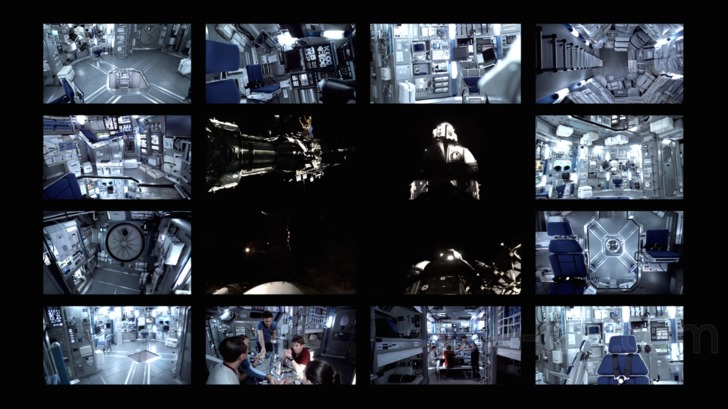
Europa Report was shot by Enrique Chediak, who also shot director Cordero's 2004 feature Crónicas, as well as The Faculty for Robert Rodriguez and 127 Hours for Danny Boyle. Given the video nature of the footage, the principal challenge for Magnolia Home Entertainment's 1080p, AVC-encoded Blu-ray is to present an accurate record of the various interviews, which are, for the most part, distinctively lit and colorful, and of the Europa One spaceship's various recorders, which are generally clear and sharp, but flat and dull without much in the way of bright or saturated colors, except upon the approach to the mission's destination, when the planet Jupiter comes into view. As one would expect from automated systems, a degree of video noise appears in response to bright light sources, but this is almost certainly intentional. Otherwise, the footage is generally clean and detailed, except where deliberate glitches have been introduced in post-production to reflect interference (a key plot point once the landing module reaches Europa) or damage to the ship (which occurs from several causes). Some of the news footage is less than pristine, presumably to simulate the quality of the genuine article. Since the elaborate effects work was created digitally and the film was finished on a digital intermediate, it's safe to assume that the Blu-ray was sourced from digital files. What we see is undoubtedly what we're meant to see. The average bitrate of 22.98 Mbps is perfectly adequate for a digitally originated project. If there were any compression errors, they were hidden in the glitches and effects work.
Europa Report Blu-ray Movie, Audio Quality 
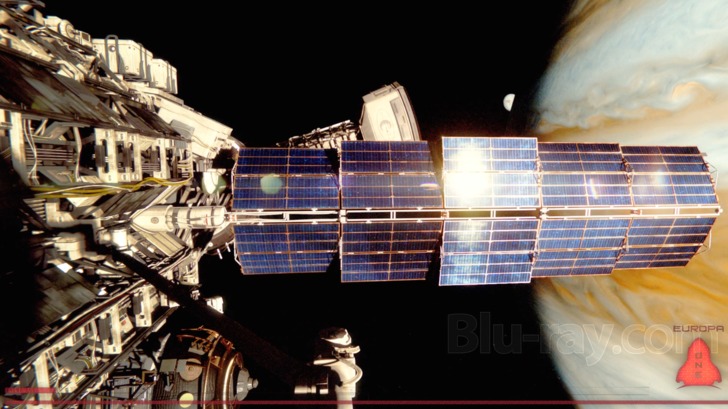
As composer Bear McCreary (Battlestar Galactica) explains in the extras, his score for Europa Report has two elements. One is a traditional orchestral underscore, which he kept minimalist and non-intrusive. The other involves synthesizers and low tones that McCreary intended to blend with the film's sound design, which is largely front-oriented to complement the documentary illusion. It is McCreary's score, with both of its components, that truly opens out the film's soundtrack, filling the listening space with odd groans and ominous portents. A series of earthquake-like rumbles after the landing module has set down on Europa provides additional sonic excitement late in the film, but for most of its running time, Europa Report relies on McCreary's contribution to expand the silence of space into something more dramatically active. The Blu-ray's lossless DTS-HD MA 5.1 soundtrack reproduces the various elements of the crew's activities and McCreary's score with precision, broad dynamic range and deep bass extension. Dialogue is generally clear, although a few of the accents are occasionally thick enough to warrant assistance from the optional English SDH subtitles.
Europa Report Blu-ray Movie, Special Features and Extras 
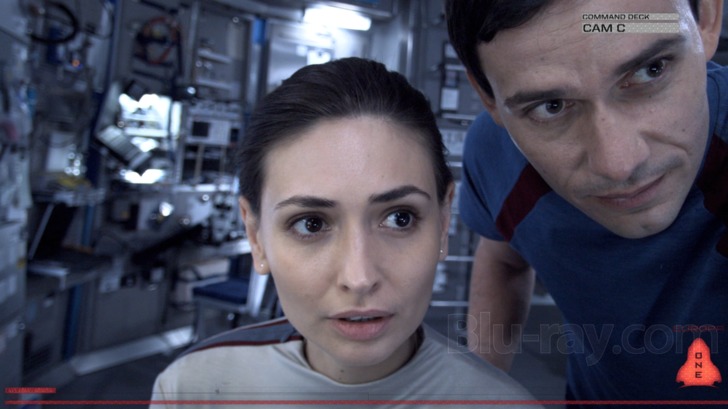
- Exploring the Visual Effects of Europa Report (1080p; 1.78:1; 6:37): Visual effects supervisor John Bair provides an overview of the techniques used to create Europa One's journey through outer space and such specific effects as weightlessness. On-set and green screen footage is included, as well as early design concepts.
- The Musical Journey of Europe Report (1080p; 1.78:1; 5:41): Composer Bear McCreary discusses his musical concepts for the film, which he saw in rough cut before he began composing the score. He is also shown conducting the orchestra for a recording session.
- Behind the Scenes Photo Gallery (1080p): Several dozen still photographs of the cast and crew at work.
- Theatrical Trailer (1080p; 1.78:1; 2:15).
- Also from Magnolia Home Entertainment: The disc includes trailers for Prince Avalanche, Drinking Buddies, Blackfish and A Hijacking, as well as a promo for AXS TV. These also play at startup, where they can be skipped with the chapter forward button.
- BD-Live: As of this writing, attempting to access BD-Live gave the message "Check back later for updates".
Europa Report Blu-ray Movie, Overall Score and Recommendation 
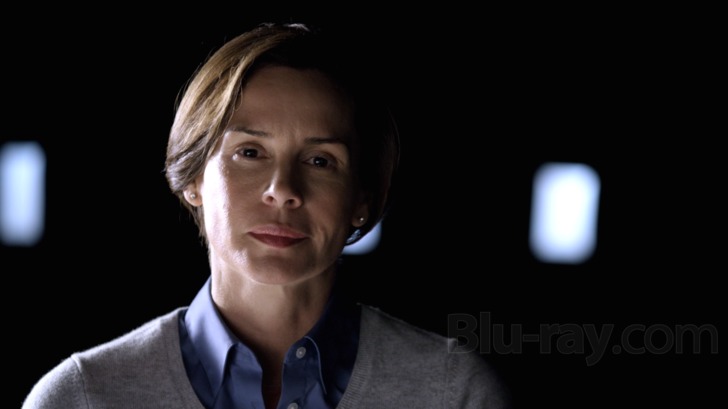
The Europa Report's glitching, fritzing video feeds make it inevitable that the film will remain classified as a "found video" creation, but the film is much more. The constant interruptions by narrators are a reminder that even what appears to be "found" is a manipulated reality shaped by an editorial point of view. The handwriting of the author (or, in this case, authors, plural) can never be completely erased, and it can be identified if one knows where to look. Cordero, who wrote and directed the very fine Crónicas (2004), is obviously intrigued by the relation between the storyteller's purpose and the story he chooses to tell. In Europa Report, he has blended that theme with the grandest speculations of which science fiction is capable. Highly recommended.
Similar titles
Similar titles you might also like

Life
2017

Fire Maidens of Outer Space
Fire Maidens from Outer Space / Slipcover in Original Pressing
1956

The Last Days on Mars
2013

Pandorum
2009

Prospect
2018

This Island Earth
1955

Forbidden Planet
Includes "The Invisible Boy" on SD
1956

The Phantom Planet
1961

The Angry Red Planet
1959

The Day the Earth Stood Still
Special Edition
1951

400 Days
2015

When Worlds Collide
1951

Conquest of Space
1955

For All Mankind: Season One
2019

Voyagers
2021

Alien 4K
40th Anniversary Edition
1979

Mission to Mars
2000

Radar Men from the Moon
1952

Stranded
2013

Ejecta
2014